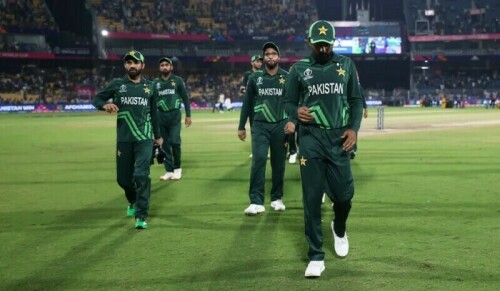LONDON: Pakistan's Haider Ali will only have one thing on his mind when he walks out in front of 80,000 spectators at the Olympic Stadium in London – upgrading the silver he won at the last Games in Beijing.
Four years ago, the 27-year-old long jumper from the “City of Wrestlers” in Gujranwala, north of Lahore, secured Pakistan's first and so far only Games medal.
“I'm well-prepared to do the best I can,” the 27-year-old, who has cerebral palsy, told a news conference on the eve of his F38 final on Wednesday evening.
Team officials see Ali as a potential world beater and are hoping to secure him up to six months of top-class coaching in Britain but his participation reflects many of the issues facing smaller delegations taking part in the Games.
Ali digs his own long jump pits in the fields of the Pakistani Punjab due to a lack of nearby facilities, highlighting the severe funding shortfall facing developing nations compounded by centuries-old prejudices towards disability.
In places like Pakistan, though, other factors come into play, with the country plagued by crumbling or non-existent infrastructure and gripped by years of domestic political instability.
Added to that, there is geo-politics, with militants in the lawless western frontier provinces fuelling conflict in neighbouring Afghanistan.
“Coming from Pakistan, we are competing not just against being marginalised as a person with disability or a humble background,” said Huma Beg, a volunteer with the Pakistan National Paralympic Committee.
“We are competing with mega-issues the world is more interested in like war or terrorism. With the 'war on terror' and more amputees, I think Pakistan and our region needs a much more solid push in getting disabled sportsmen their rights.
“That's the effort the NPC is making.”
But Beg and NPC president Tariq Mustafa are hopeful that Ali's participation will spur change. Pakistani television has already broadcast the Paralympic opening ceremony and has a daily highlights programme for the first time.
Mustafa also said awareness of disabled sport had increased because the Games were in London, with interest piqued due to Britain's status as the former colonial power and continued ties through its substantial Pakistani community.
For Ali and his only other team-mate Naeem Masih, who ran in the T46 1,500m heats for upper limb amputees but failed to qualify for the final, the experience has been invaluable.
“I'm happy,” said Masih, 25, from Kasur, south of Lahore near the border with India, and a minority Christian. “This was the first time I have been abroad. The weather was different and the track was very hard.
“I was in awe of the crowd. It made me a little bit nervous. But next time I'm going to work even harder now I know what it's all about.”
Mustafa said he was grateful for the NPC's existing support but said they needed more, with a lack of secured funding making it impossible to take competitors to international meets to make qualifying standards.
“It is a constant struggle. We get the support from the government but it's ad hoc. It has yet to be put on a regular firm footing. That's one of the challenges we are trying to sort out,” he added.
“We do get support. That's why we're here but we need more. We need permanent facilities. We need a structure through which we can filter out the talent to coach them and train them... it's a hand-to-mouth existence.”
For example, funding for London was only secured a week before the Games, effectively ruling out pre-competition training camps, while a private airline paid the way of athletes and officials to London.
Mustafa, meanwhile, said they were hoping to increase the participation of women in disabled sport but there were indications of scope for development despite traditional attitudes in the conservative Muslim country.
A women-only competition has been held in the northwest frontier city of Peshawar, which despite predictions of violence and opposition, passed off without “a single incident... that was embarrassing to the community,” he said.














































